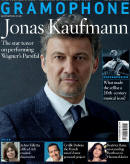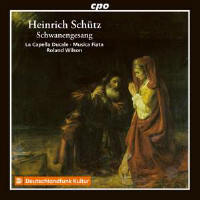Texte paru dans: / Appeared in: |
|
|
Outil de traduction |
|
|
Schwanengesang divides the lengthy Psalm 119 into 11 motets and adds a concise treatment of the joyful Psalm 100 and a German Magnificat – all of them set for two four-part choirs. Roland Wilson emulates Schütz’s instructions in Psalmen Davids (1619) and Geistliche Chormusik (1648) by adding ad libitum instruments. The methods are seldom a simple matter of doubling the voices; more often, Wilson uses transposition to convert two equal choirs into high and low groupings of solo voices with mixed instruments. To this end, Musica Fiata’s panoply of instruments form sonorous partnerships with up to eight of La Capella Ducale’s experienced consort singers, supported by omnipresent albeit discreet chittaroni and organs.
‘Du tust Guts deinem Knechte’ has darkhued polychoral sonorities between Choir 1 (solo alto Alexander Schneider and three dulcians, including a great bass dulcian) and Choir 2 (alto David Erler and three trombones); the extraordinary density of low instruments joining together in the doxology is a far cry from homogenised chamber choirs. ‘Wie habe ich dein Gesetze so lieb’ is recast as a noble dialogue between three cornetti with bass Markus
Flaig and three trombones with alto Schneider. Four radically distinct groupings provide abundant surprises in ‘Deine Zeugnisse sind wunderbarlich’; a soprano voice with lutes, a tenor with three trombones, four SATB voices, and three cornetti with a bass voice. Mixed instruments are sometimes held back until they enter upon lines of poetic emphasis or join for high-impact doxologies – such as the splendour of reinforced tuttis throughout key passages of ‘Gedenke deinem Knechte an dein Wort’. Nor does Wilson’s cultivation of diverse approaches overlook the simplest option to perform two motets with eight articulate voices accompanied by nothing more than continuo. There is touching serenity in the climax to Psalm 119, but assorted special effects are let off the leash in the celebratory Psalm 100 (‘Jauchzet dem Herrn alle Welt’). Wilson reconstructs the missing soprano and tenor parts. In accordance with plausible historical practice, his performers use high pitch (A=465) and meantone temperament. There are other ways to tackle Schütz’s last testament, yet every musical element and dimension is considered and executed with acumen. |
|




